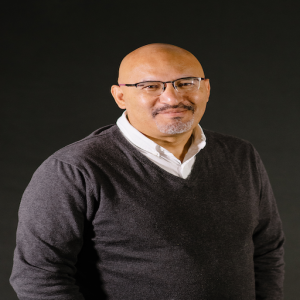
26K
Downloads
304
Episodes
The Chills at Will Podcast is a celebration of the visceral beauty of literature. This beauty will be examined through close reads of phrases and lines and passages from fiction and nonfiction that thrills the reader, so much so that he wants to read again and again to replicate that thrill. Each episode will focus on a different theme, such as "The Power of Flashback," "Understatement," "Cats in the Cradle," and "Chills at Will: Origin Story."
Episodes

Saturday Aug 21, 2021
Saturday Aug 21, 2021
Show Notes and Links to Roberto Lovato’s Work and Allusions/Texts from Episode 73
On Episode 73, Pete talks with Roberto Lovato about his outstanding, moving, and illuminating memoir, Unforgetting. Using the book as a foundation, the two talk about US foreign policy in El Salvador and beyond, media and propaganda, connections between the past and today, “La Matanza” and other traumatic events in El Salvador’s history, the importance of “unforgetting” and “re-membering,” and hope as embodied by the Salvadoran resolve and beauty shown despite great tragedies.
Roberto Lovato is the author of Unforgetting: A Memoir of Family, Migration, Gangs and Revolution in the Americas (Harper Collins), a memoir picked by the New York Times as an “Editor’s Choice” that the paper also hailed as “Groundbreaking…. A kaleidoscopic montage that is at once a family saga, a coming-of-age story and a meditation on the vicissitudes of history, community and, most of all for [Lovato], identity.” Newsweek listed Lovato’s memoir as a “must read” 2020 book and the Los Angeles Times listed it as one of its 20 Best Books of 2020. Lovato is also an educator, journalist and writer based at The Writers Grotto in San Francisco, California. As a Co-Founder of #DignidadLiteraria, he helped build a movement advocating for equity and literary justice for the more than 60 million Latinx persons left off of bookshelves in the United States and out of the national dialogue. A recipient of a reporting grant from the Pulitzer Center, Lovato has reported on numerous issues—violence, terrorism, the drug war and the refugee crisis—from Mexico, Venezuela, El Salvador, Dominican Republic, Haiti, France and the United States, among other countries.
Roberto Lovato Personal Website
At about 2:30, Roberto talks about the journey that his book takes him on, and how it’s an investigation of secret history and
At about 4:30, Roberto talks about his literary childhood, including his connection with Danny Dunn, The Bible, and Piri Thomas, among others; he connects his reading to Carl Jung’s quote-”The gold is in the dark” and talks about his extensive lifetime habit of writing in journals
At about 7:00, Roberto discusses education’s history in his family and gives background on his father's childhood in El Salvador; this leads to an outline
At about 10:10, Roberto explains the feeling of being “half-dead” as a Salvadoran-American and ideas of post-traumatic stress and the connections felt to his story by those of the Salvadoran and Jewish diasporas
At about 11:40, Roberto talks about obstacles to his intellectual growth, though he was identified as a “gifted” child, and he gives a summary of the book through a description of his relationships with people and places throughout
At about 12:45, Roberto talks about early reading and refuge through reading The Bible, and believing that “words had the power of God”
At about 14:20, Roberto talks about the different religious organizations he’s been part of in his life, with his love for The Word being the one constant
At about 15:30, Pete references the universal and hyper-specific references to trauma and fascism and quotes the wise Hannah Arendt, saying “terror forces oblivion”; Roberto reverses the Arendt quote and connects it to US government policies of Central American child separation and “normalization of fascist tendencies” in the US
At about 21:00, Roberto explains the path he took to becoming a writer/journalist and the path to Unforgetting that crystallized around age 50, including visits to Karnes, Texas and learning about migration stories and jailing and separation of Central American children and America’s historically-destructive role in Él Salvador
At about 25:10, Pete compliments the ways in which Roberto seamlessly builds pathos through the nonlinear narrative, and this leads to talk of earlier Salvadoran immigration caused by Reagan and US policies in the region, as evidenced by what was once called The School of the Americas
At about 28:30, Roberto talks about the ways in which Salvadorans and Central Americans are erased from telling their own stories and how organizations like FAIR have found disturbing patterns in diction that paints Central Americans as two-dimensional; Roberto also cites his own research on media narratives, written for The Columbia Journalism Review
At about 35:00, Roberto discusses the interests of the United States, especially economic ones, as catalysts in backing horrible governments in Central America and beyond, in particular in backing the Salvadoran military dictator who enacted “La Matanza,” in which 10-40,000 are said to have been killed
At about 37:00, Roberto cites his book as an “only” among the “Big Four Publishers” and he talks about how hard he had to work to tell his Central American stories, as opposed to those writers who are not Central American and often tell one-sided, surface-level stories for which they are often lauded
At about 39:20, Roberto talks about his book as an exploration at the way he and other Americans look at their country and at themselves; he explicates by talking about ideas of “American exceptionalism” in movies and media
At about 42:40, Roberto and Pete delve into Salvadoran “Conradesque” depictions by mainstream writers, especially the famous/infamous quote by Joan Didion-Roberto’s article about her words is here
At about 47:00, Pete asks Roberto about the flipside of negative and simplistic portrayals of Salvadorans-the failure to know them in society as a whole AND the lack of knowledge within the Salvadoran communities of past history and atrocities; Roberto quotes Roque Dalton and interesting poll numbers
At about 48:55, Roberto’s interesting take on important parts of the Salvadoran experience being “lost in translation” reminds Pete of an anecdote from the book about a well-read Salvadoran gang leader and leads to discussions of retelling and stories’ and their differing context and Roberto’s takes on being bilingual and bicultural
At about 51:50, Roberto talks about the significance of the book’s title and its connection to ancient Greek and Hannah Arendt
At about 56:25, Roberto discusses his use of “re-membering” in the book and its implications and the power of rebellion in his life
At about 59:50, Roberto talks about various meanings of apocalypse and its connections to the book
At about 1:02:30, Roberto explains the statistics from various institutes that place the Salvadoran “La Matanza” of 1932 as one of, or possible, the worst concentrated massacre in 20th century
At about 1:04:15, Roberto discusses the Salvadoran indigenous people as by far the biggest victims in state violence and connections between Vietnam and El Salvador
At about 1:05:25, Pete compliments the beautiful ending of the book with its beautiful sewing metaphor
You can now subscribe to the podcast on Apple Podcasts, and leave me a
five-star review. You can also ask for the podcast by name using Alexa, and find the pod on Spotify, Stitcher, and on Amazon Music. Follow me on IG, where I’m @chillsatwillpodcast, or on Twitter, where I’m @chillsatwillpo1. You can watch this episode and other episodes on YouTube-you can watch and subscribe to The Chills at Will Podcast Channel.
This is a passion project of mine, a DIY operation, and I’d love for your help in promoting what I’m convinced is a unique and spirited look at an often-ignored art form.
The intro song for The Chills at Will Podcast is “Wind Down” (Instrumental Version), and the other song played on this episode was “Hoops” (Instrumental)” by Matt Weidauer, and both songs are used through ArchesAudio.com.
I’m excited to welcome the intrepid, thoughtful, and profound journalist, Jean Guerrero, for my next episode, so be sure to check out that episode on August 25.

No comments yet. Be the first to say something!